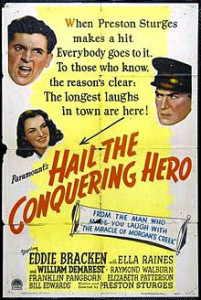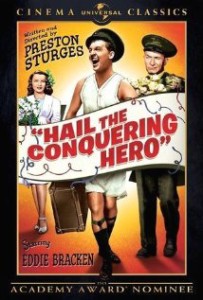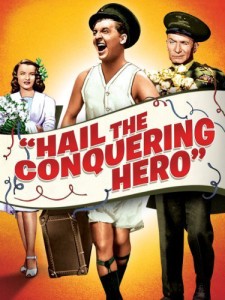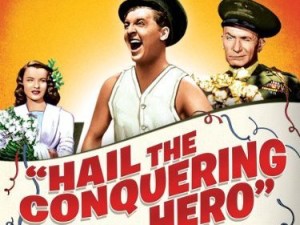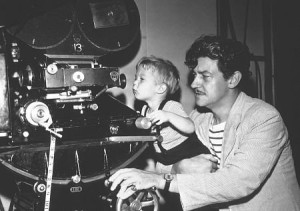Hail the Conquering Hero ***** (1944, Eddie Bracken, Ella Raines, William Demarest, Raymond Walburn, Franklin Pangborn, Bill Edwards) – Classic Movie Review 2623
Writer-producer director Preston Sturges is seen here in 1944 on his finest satirical comedy drama form in one of his best movies. Sturges said that of all his films, it was ‘the one with the least wrong with it’.
Sturges was nominated for the 1945 Academy Award for his screenplay. He reunites with his stars of his previous movie, The Miracle of Morgan’s Creek, Eddie Bracken and William Demarest.
Bracken plays hay fever victim Woodrow Truesmith, who is booted out by the army but is mistakenly given a war hero’s welcome by the folk of his home town when he returns.
The first half especially is extremely funny, with marvellous dialogue and wonderful non-sequiturs. However, in the second half there is a slight trailing off into comfortable sentimentality towards the end.
But this slight defect is offset by the film’s cracking pace, the rapid-fire punch lines and the outstanding comedic acting from the Sturges stock company of character actors, especially gruff Demarest as Master Gunnery Sergeant Heppelfinger, flustered Franklin Pangborn as the Committee Chairman and bumbling Raymond Walburn as the pompous mayor, Everett Noble.
This is the ninth of ten films written by Sturges that Demarest appeared in. Also notable are Ella Raines as Woodrow’s girlfriend Libby and Bill Edwards as the mayor’s son Forrest Noble.
Paramount wanted actress Raines to be replaced, thinking she did not look like a small-town girl and did not have enough box-office draw. As filming had already started, Sturges refused to replace her. ‘To have her thrown off the picture after she had started shooting, with all the publicity that engendered, would ruin her career.’
Sturges’s targets this time are mindless hero-worship, mindless patriotism, mindless military glory, small-town stupidity, small-town politicians and Americans’ over-reverence for the institution of motherhood.
Of course it was very daring to send up things as American as apple pie like these during the Second World War, and tricky to work within the requirements of the Hollywood Production Code. But both The Miracle of Morgan’s Creek and Hail the Conquering Hero were in tune with the times and immensely popular. Perhaps odder is that they still are.
It was the end of an era as the eighth and final film Sturges made for Paramount Pictures as his contract ran out. He wrote: ‘I guess Paramount was glad to be rid of me eventually, as no one there ever understood a word I said.’
The title re-uses that of George Frideric Handel’s musical composition.
Many members of Sturges’s unofficial stock company of character actors appear, including George Anderson, Al Bridge, Georgia Caine, Chester Conklin, Jimmy Conlin, William Demarest, Harry Hayden, Esther Howard, Arthur Hoyt, George Melford, Torben Meyer, Charles R Moore, Frank Moran, Jack Norton, Franklin Pangborn, Victor Potel, Dewey Robinson and Robert Warwick.
When the Marines leave the Oakdale station, a billboard behind them advertises Sturges’s previous film The Miracle of Morgan’s Creek.
After producer Buddy G DeSylva re-cut the film and faced unsuccessful previews, he accepted Sturges’s offer to return unpaid to rewrite the script. Retakes, directed by Sturges, were done in April 1944, and Sturges restored his overall conception of the film.
Sturges died in 1959 of a heart attack at the Algonquin Hotel while writing his autobiography, which ironically he intended to title The Events Leading Up to My Death. It was published in 1990 as Preston Sturges by Preston Sturges: His Life in His Words. He has a star on the Hollywood Walk of Fame.
© Derek Winnert 2015 Classic Movie Review 2623
Check out more reviews on http://derekwinnert.com

